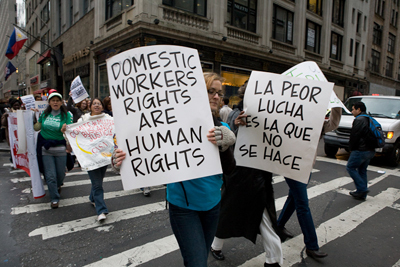
This week’s New York Times Magazine is titled “Saving the World’s Women.” That’s an unfortunate title, made worse by the title of the lead article, “The Women’s Crusade” by Nicholas Kristoff and Sheryl WuDunn. Does The New York Times understand the word crusade? Just this month, Blackwater’s founder/owner Erik Prince was reported to think of his company’s mission in Iraq as a holy Christian crusade, “tasked with eliminating Muslims and the Islamic faith from the globe”. It’s The New York Times that broke this news: “C.I.A. Sought Blackwater’s Help to Kill Jihadists”. The Crusades come in many guises, and yet only one form.
“The Women’s Crusade” is nestled in a curious neighborhood of articles. “A New Gender Agenda” offers a fairly adulatory interview with Hillary Clinton, while “Madame President” offers a fairly adulatory interview with Helen Johnson Sirleaf. “A School Bus for Shamsia” tells a personal account of trying to do good for and by girls in rural Afghanistan: “it turns out that giving isn’t always easy.” An article on women’s philanthropy, “The Power of the Purse,” suggests that women giving to women in need actually isn’t all that complicated. What’s complicated, according to “The Daughter Deficit”, is that in China and in India, “development” has not eradicated prejudice against nor disappointment in the birth of girls. To the contrary, modernity and prosperity have seemingly worsened the situation. And the last story, “Truck-Stop Girls”, is the `human interest’ piece. It combines a U.S.-based international aid worker, a Swazi sex worker, tears, compassion and wisdom. The issue as a whole follows a fairly predictable script, that of liberal concern for the poor women of the world.
Kristoff and WuDunn’s article centers on personal accounts of women’s heroic efforts to organize their own individual resources and those of their communities. These are contextualized by statistics that show how women in developing countries have it hard, especially when compared to the lives of women in economically `advanced’ countries.
The article is framed by “the sky”. Near the beginning, the authors note, “`Women hold up half the sky’, in the words of a Chinese saying.” That sky all but disappears until the very end, the story of Tererai Trent, a young rural Zimbabwean woman who struggled and organized, with the aid of an international agency, and managed to get an education, and is managing now to further her education, in the United States. Here’s how the article ends: “There are many metaphors for the role of foreign assistance. For our part, we like to think of aid as a kind of lubricant, a few drops of oil in the crankcase of the developing world, so that gears move freely again on their own. That is what the assistance to Tererai amounted to: a bit of help where and when it counts most, which often means focusing on women like her. And now Tererai is gliding along freely on her own — truly able to hold up half the sky.”
Individually, these are important and inspirational stories, stories to be shared and celebrated. At the same time, taken together, they are haunted by that sheltering sky.
An incautious or quick reader would think that the sky only exists in `distant places’, such as Zimbabwe, Swaziland, Liberia, Kenya, India, China, Afghanistan, Pakistan. An incautious or quick reader would think that there is no sky to be held up in the United States. That reader would never know that women of color, immigrant and native-born, comprise the fastest growing sector of the prison explosion in the United States. That reader would never know that women of color, immigrant and native-born, constitute the material as well as political body of the domestic service sector, one of the fastest growing in the United States, and, structurally, one of the most prone to abuse and super-exploitation of workers. That reader would never know that women of color have been targeted for violence, by policy makers and legislators, by law enforcement officers and prison staff, by employers and urban renewal `developers’. That reader would never know of the Crusade against women, and especially women of color, that goes on now, in the United States.
Women in the United States, and especially women of color, irrespective of where they were born, also hold up half a sky, also know themselves to be part of “a powerful truth: Women and girls aren’t the problem; they’re the solution”. The sky that knows no borders, and recognizes no crusaders, sits over all woman, everywhere.
(Photo Credit: NYC Independent Media Center)